|
|
|
Sort Order |
|
|
|
Items / Page
|
|
|
|
|
|
|
| Srl | Item |
| 1 |
ID:
131852
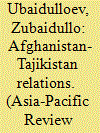

|
|
|
|
|
| Publication |
2014.
|
| Summary/Abstract |
This article attempts to touch upon the relations between Afghanistan and Tajikistan, two neighboring countries, from the historical perspective and the current period. The article analyses the history of Afghanistan-Tajikistan relations during and after the Soviet era, especially during the Afghan Mujahideen's struggle against the Soviet occupational army and Taliban regime in Afghanistan, the Tajikistan civil war of 1992-1997, and after September 11, 2001. In addition, the issues of the ethnic Tajiks in Afghanistan, the violent and vulnerable Tajik-Afghan border, the withdrawal of NATO troops from Afghanistan in 2014 and its impact on Afghanistan-Tajikistan relations, and the new phase of economic relations and an effective cooperation between the both countries are discussed. The article tries to fill the gaps within the body of existing literature and understanding concerning the topic.
|
|
|
|
|
|
|
|
|
|
|
|
|
|
|
|
| 2 |
ID:
167335
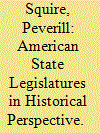

|
|
|
| 3 |
ID:
131430
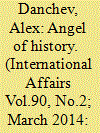

|
|
|
|
|
| Publication |
2014.
|
| Summary/Abstract |
This article explores the way in which art can illuminate war, in particular the Great War. It focuses on Paul Klee's painting, Angelus novus (1920), and the interpretation of that painting by Walter Benjamin, who owned it, in his celebrated theses 'On the concept of history' (1940). Benjamin's interpretation was a kind of parable: he called it the angel of history. Some have taken inspiration from that characterization; others have offered striking alternatives, including Kaiser Wilhelm II and even Adolf Hitler. The article traces the evolution of these identifications; it also considers the continuing artistic response, in historical perspective-notably Anselm Kiefer's The angel of history: poppy and memory (1989). It argues that our conception of the war, and of all wars, is profoundly affected by artistic imagination, and re-imagination.
|
|
|
|
|
|
|
|
|
|
|
|
|
|
|
|
| 4 |
ID:
154188
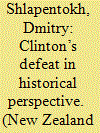

|
|
|
| 5 |
ID:
143824
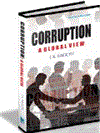

|
|
|
|
|
| Publication |
New Delhi, Mittal Publications, 2014.
|
| Description |
xix, 155p.hbk
|
| Standard Number |
8183244688
|
|
|
|
|
|
|
|
|
|
|
|
Copies: C:1/I:0,R:0,Q:0
Circulation
| Accession# | Call# | Current Location | Status | Policy | Location |
| 058472 | 364.1323/BAG 058472 | Main | On Shelf | General | |
|
|
|
|
| 6 |
ID:
161309
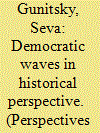

|
|
|
|
|
| Summary/Abstract |
For over two centuries, the evolution of democracy has been marked by repeated democratic waves. Yet these cross-border bursts of revolution and reform have varied widely in their origins, intensity, and success rates. How do we compare cascades of regime change, and what lessons do they offer about the spread of democracy? I lay out a historical framework of democratic waves that focuses on recurring causal mechanisms across time. Thirteen democratic waves are categorized according to two dimensions: 1) the origins of external influence, located in either vertical hegemonic transformations or in horizontal cross-border linkages; 2) the strength of external influence, taking the form of contagion when outside forces dominate and emulation when domestic focal points shape the timing of contention. This approach allows for more meaningful comparisons between these important, recurring, yet seemingly incomparable democratic waves. More generally, it suggests that the global history of democracy cannot be reduced to the sum of its national trajectories.
|
|
|
|
|
|
|
|
|
|
|
|
|
|
|
|
| 7 |
ID:
149223
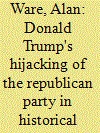

|
|
|
|
|
| Summary/Abstract |
Four aspects of Donald Trump's hijack of the Republican party are examined. First, how he used unconventional techniques, usually associated with some ‘reality’ television programmes, to become the leading candidate in the pre-primary debates. He could thereby develop ‘momentum’ before the primaries began despite his limited support among Republican activists. Second, how his insurgency differed from the party's takeover in 1964 by supporters of Barry Goldwater. Third, how the Republicans have replaced the Democrats since the early 1980s as the party with a less cohesive potential coalition among voters, with the result that internal party relations became more conflictual throughout the period. Finally, that internal conflict has been intensified by two factors in those decades: the prevalence of divided government, which has made it virtually impossible to impose a truly conservative agenda on federal government policy, and the impact of forty years of stagnating real incomes for many middle-income Americans.
|
|
|
|
|
|
|
|
|
|
|
|
|
|
|
|
| 8 |
ID:
173872
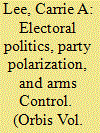

|
|
|
| 9 |
ID:
166624
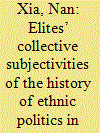

|
|
|
|
|
| Summary/Abstract |
Malaysia is one of the multi-ethnic, multi-cultural and multi-religious countries in Southeast Asia. Due to the pluralistic nature of Malaysia, it has a political structure based on ethnic politics. The ethnic preferential policies affected most domains of this country. The objective of this article is to examine the origin and background of ethnic politics in Malaysia. Findings of this study indicate that, ethnic politics originated during the British colonial period, it became a tool used by the Barisan Nasional for the legitimacy of regime. Moreover, ethnic politics in Malaysia today is intertwined with religion. Besides, there is the dilemma of the choice between the interest of certain ethnic group and national interests. However, with the opposition coalition Pakatan Harapan won the election in 9th May, UMNO-led BN lost power and interrupted its 61 years control, which leaves us an interesting topic to think about the future of Malaysian ethnic politics.
|
|
|
|
|
|
|
|
|
|
|
|
|
|
|
|
| 10 |
ID:
143819
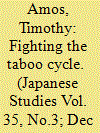

|
|
|
|
|
| Summary/Abstract |
This article explores the historical significance of an incident reported in the international media in 2009 when Burakumin groups raised concerns about privacy and possible human rights abuses in relation to a new map service offered by Google. Reportage at the time indicated that historical maps containing references to outcaste settlements could be laid over contemporary maps to disclose the exact location of contemporary Buraku districts. A thorough examination of the incident, however, reveals a more complicated story. On the one hand the incident is clearly an example of ‘human rights activism’, an ongoing political strategy within the Buraku liberation movement to achieve permanent legal recognition of their status in the face of a state that has long resisted such demands. At the same time, however, the main features of this incident – silence, revelation, protest, and erasure – are also reoccurring themes within modern Buraku history that comprise what is described in the article as a taboo cycle. In their struggles for liberation, Burakumin have developed numerous strategies to combat the cycle as well as use it to their advantage.
|
|
|
|
|
|
|
|
|
|
|
|
|
|
|
|
| 11 |
ID:
089339
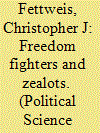

|
|
|
|
|
| Publication |
2009.
|
| Summary/Abstract |
Christopher J. Fettweis argues that too many post-September 11 analyses of terrorism seem to regard the phenomenon as brand new. Terrorism has existed throughout history, and its groups come in two forms: nationalist and ideological. This simple binary typology illuminates a number of important characteristics of terrorism, from group strategy and tactics to overall life expectancy. Perhaps most important, counter-terrorism measures that prove effective against groups in one category will often fail against those in the other.
|
|
|
|
|
|
|
|
|
|
|
|
|
|
|
|
| 12 |
ID:
151133
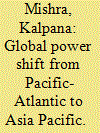

|
|
|
|
|
| Summary/Abstract |
Global power shifts are strategically and politically significant. It tends to displace or restructure existing international order. The global strategic, political and financial structures have been dominated by the U.S. and Europe. Asia remained dominated by European colonization for two centuries and was there after dominated by the U.S. strategically for one more century. Asia’s economic resurgence and cumulative financial strengths over the last two decades have substantially contributed to the global shift of power to Asia.
|
|
|
|
|
|
|
|
|
|
|
|
|
|
|
|
| 13 |
ID:
170933
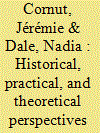

|
|
|
|
|
| Summary/Abstract |
This article analyses changes in diplomatic practices brought by twenty-first century communications technologies. There exists a close relationship between communications technologies and diplomatic practices. Since the invention of the telegraph at the end of the nineteenth century, diplomacy has been conducted at a progressively faster pace. The most recent technological developments associated with Internet have increased the speed and reach of communications, with consequences in international politics that International Relations scholars have yet to understand. Building on existing scholarship in diplomatic studies, the analysis adopts a historical perspective on the use of technology in diplomacy, examines the impact of digitalisation on diplomatic practices, and suggests new research questions that scholars need to answer. All this shows that International Relations scholars would be well-served by looking at the transformative impact of new communications technologies.
|
|
|
|
|
|
|
|
|
|
|
|
|
|
|
|
| 14 |
ID:
133077
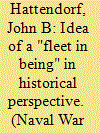

|
|
|
|
|
| Publication |
2014.
|
| Summary/Abstract |
The phrase "fleet in being" is one of those troublesome terms that naval historians and strategists have tended to use in a range of different meanings. The term first appeared in reference to the naval battle off Beachy Head in 1690, during the Nine Years' War, as part of an excuse that Admiral Arthur Herbert, first Earl of Torrington, used to explain his reluctance to engage the French fleet in that battle. A later commentator pointed out that the thinking of several British naval officers ninety years later during the War for American Independence, when the Royal Navy was in a similar situation of inferior strength, contributed an expansion to the fleet-in-being concept. To examine this subject carefully, it is necessary to look at two separate areas: first, the development of the idea of the fleet in being in naval strategic thought, and, second, the ideas that arose in the Royal Navy during the War of the American Revolution.
|
|
|
|
|
|
|
|
|
|
|
|
|
|
|
|
| 15 |
ID:
139647
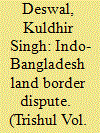

|
|
|
| 16 |
ID:
086145
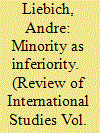

|
|
|
|
|
| Publication |
2008.
|
| Summary/Abstract |
This article argues that minority rights developed as an indemnity offered to defeated parties. As a grudging and begrudged calculus of compensation, considered inadequate by the vanquished and offensive by the victors, minority rights have been unable to compete in terms of legitimacy with either an increasingly robust international human rights regime or with the right of national self-determination. After reviewing some explanations for the weakness of the existing minority rights regime, this article traces the rationale of what may be described anachronistically as minority rights provisions in international treaties from the Peace of Westphalia to the Versailles settlement, concluding with a consideration of present-day implications of the argument elaborated here.
|
|
|
|
|
|
|
|
|
|
|
|
|
|
|
|
| 17 |
ID:
171980
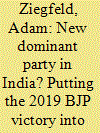

|
|
|
|
|
| Summary/Abstract |
The 2019 Indian national election delivered a convincing victory to the BJP and, along with it, prognostications of future BJP election wins. The BJP’s victory was certainly impressive, but does it portend a prolonged period of BJP rule at the national level? As of 2019, any predictions of the BJP’s long-term dominance are premature. The election revealed that the BJP possesses relatively few of the party-system advantages common to other dominant parties, including India’s former dominant party, Congress, during its period of dominance. Whereas a party is ideally situated to become dominant when it is large, enjoys a deep and broad base of support, and faces an opposition that is both fragmented and stigmatized, the BJP’s main advantage lies in its relatively deep support base in its political strongholds. On other dimensions, the BJP has far less in common with other dominant parties.
|
|
|
|
|
|
|
|
|
|
|
|
|
|
|
|
| 18 |
ID:
174827
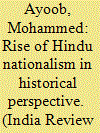

|
|
|
|
|
| Summary/Abstract |
The article traces the rise of Hindu nationalism and its rise to power. It identifies three major variables responsible for Hindu nationalism’s rise and success. First, British historiography that made the Hindu-Muslim animosity the centerpiece for historical analysis in order to justify British rule coupled with a deliberate policy of divide and rule that widened the chasm between the two communities. Second, the writings of Savarkar and other ideologues such as Golwalkar that presented this dichotomy starkly and painted the Indian Muslim as the quintessential “other” thus arguing that Hindus alone were the real owners of the land and Muslims were interlopers. Third, and possibly the most important, the partition of the country in 1947 that hived away the Muslim majority areas from India thus rendering Indian Muslims demographically and politically marginal if not irrelevant in independent India thus paving the way for the eventual capture of power by Hindu nationalists.
|
|
|
|
|
|
|
|
|
|
|
|
|
|
|
|
| 19 |
ID:
161037
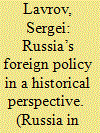

|
|
|
|
|
| Summary/Abstract |
As international relations go through a period of turbulence, Russia, as many times before, has found itself at a crossroads of key trends that will determine the direction of global development in the future.
|
|
|
|
|
|
|
|
|
|
|
|
|
|
|
|
| 20 |
ID:
146256
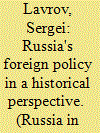

|
|
|
|
|
| Summary/Abstract |
There are different opinions, and doubts too, as to whether Russia assesses the international situation and its position in the world soberly enough. This is an echo of never-ending disputes between pro-Western liberals and the advocates of one's own unique path. There are also people, both inside and outside the country, who believe that Russia is doomed to constantly fall behind and catch up, or adapt to the rules invented by others, and therefore cannot claim a rightful role in international affairs. Let me offer some thoughts on these issues, recalling facts from history and drawing historical parallels.
|
|
|
|
|
|
|
|
|
|
|
|
|
|
|
|
|
|
|
|
|